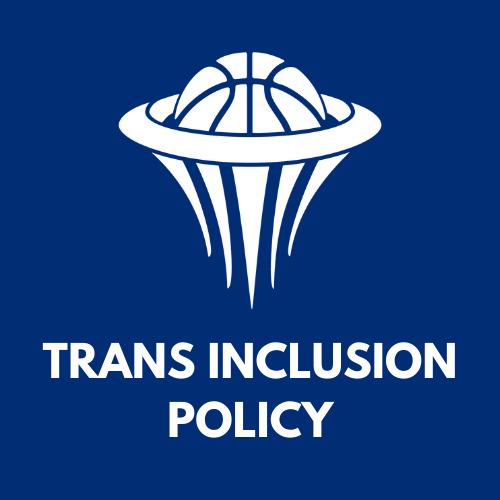Trans Inclusion Policy

Guiding Principles
1. Basketball Nova Scotia and Canada Basketball support the recommendations outlined in Creating Inclusive Environments for Trans Participants in Canadian Sport, the guidance document developed by the Trans Inclusion in Sport Expert Working Group and published by the Canadian Centre for Ethics in Sport (CCES) Association and adopts the best practices outlined in the document and has used the four Policy Guidance statements in the development of this Inclusion Policy. The Policy Guidance statements are:
a) Individuals participating in development and recreational sport (LTAD stages Active Start, FUNdamental, Learn to Train, Train to Train, Train to Compete (until international federation rules apply) and Active for Life) should be able to participate in the gender with which they identify and not be subject to requirements for disclosure of personal information beyond those required of cisgender athletes. Nor should there be any requirement for hormonal therapy or surgery.
b) Hormone therapy should not be required for an individual to participate in high-performance sport (LTAD stages Train to Compete (once international federation rules become a factor) and Train to Win) in the gender category that is consistent with their gender identity, unless the sport organization can prove that hormone therapy is a reasonable and bona fide requirement.
c) Individuals should not be required to disclose their trans identity or history to the sport organization in order to participate in high-performance sport (LTAD stages Train to Compete (once international federation rules become a factor) and Train to Win) unless there is a justified reason requiring them to do so.
d) Surgical intervention should not be required for an individual to participate in high-performance sport (LTAD stages Train to Compete (once international federation rules become a factor) and Train to Win) in the gender category that is consistent with their gender identity.
Definitions
2. The following definitions are outlined for either education and or their meaning in this policy:
1. “Basketball Nova Scotia team or event” (BNS) - includes any member, team, tournament, training opportunity or other sanctioned event organized or managed by Basketball Nova Scotia.
2. “Sex (or Sex Assigned at birth)” - The classification of people as male, female or intersex. Sex is usually assigned at birth and is based on an assessment of a person’s reproductive system, hormones, chromosomes and other physical characteristics, most notably by external genitalia.
a. “Intersex” - An umbrella term used for a variety of situations in which a person is born with reproductive or sexual anatomy that doesn’t fit the boxes of “female” or “male.”
3. “Gender” - The socially constructed roles, behaviours, activities, and attributes that a society assigns to masculinity or femininity depending on the time and place of consideration.
4. “Gender norms” - The gender binary system influences what many people consider “normal” or acceptable behaviours, dress, appearances and roles for women and men. Gender norms are a prevailing force in everyday lives. Strength, action and dominance are stereotypically seen as “masculine” traits, while vulnerability, passivity and receptiveness are stereotypically seen as “feminine” traits. A woman expressing masculine traits may be stereotyped as overly “aggressive,” while a man expressing “feminine” traits may be labelled as “weak.” Gender norms can contribute to power imbalances and gender inequality in the home, at work and in communities.
5. “Gender Identity” - A person’s innermost sense and understanding of their own gender. This can include man, woman, both neither or something else entirely. Gender also refers to a variety of social and behavioral characteristics (e.g. appearance, mannerisms). There are lots of words people may use to talk about their gender identity and expression
a. “Cis” - denoting or relating to a person whose sense of personal identity and gender corresponds with their birth sex.
b. “Trans” - An umbrella term for people whose gender identity does not align with what was assigned to them at birth.
c. “Gender reassignment” - medically-supervised program of treatment to transition a person’s body to align with their gender identity through hormone therapy and/or surgery. Not all trans people need, want, or have access to gender reassignment/ gender affirming hormones or surgeries, but that doesn’t make their identity invalid.
d. “Transgender Woman/Girl” (including trans female, trans femme, trans woman or trans feminine) - Someone who was assigned the male sex at birth, but whose gender identity is female
e. “Transgender Man/Boy” (including trans male, male, trans man, trans masc or trans masculine) - Someone who was assigned female sex at birth, but whose gender identity is male
f. “Gender Fluid” - Those who identify outside the categories of woman/man, those who see their gender identity as fluid and moving between different genders at different times in their life. “Gender queer” and “gender diverse” are increasingly common terms used to identify this fluidity.
6. “Gender Expression” - The way an individual externally communicates their gender identity to others. This is done through appearance, behaviour, mannerisms, body language, voice, emphasis or de-emphasis of bodily characteristics, choice of clothing, hairstyle, and wearing make-up and/or accessories. The traits and behaviours associated with masculinity and femininity are culturally specific and change over time, which doesn’t always correlate with gender identity.
7. “Non-binary” - an umbrella term for gender identities that don’t fit within the gender binary of being either a man or woman but somewhere between, neither, fluid, or something else.
8. “Participant” - any player, parent, guardian, manager, trainer, coach, official, organizer or other individual involved in the administration, support or conduct of a Nova Scotia Basketball team or event.
Basketball Nova Scotia supports Inclusion of Trans Participants
3. Basketball Nova Scotia is an inclusive organization and welcomes participation of all individuals in our programs and activities, irrespective of race, ancestry, place of origin, colour, religion, citizenship, creed, sex, sexual orientation, gender identity, gender expression, age, marital status, family status, or physical or mental disability. Basketball Nova Scotia has a zero-tolerance policy for harassment of any kind. BNS takes appropriate measures to create welcoming environments and takes action when reports of harassment are made. Processes for reporting incidents can be found in our Bullying & Harassment Policy, Prevention of Abuse Policy and Harassment Policy. Basketball Nova Scotia wants to ensure that all participants have access to programming and facilities in which they feel comfortable, safe and included. Basketball Nova Scotia is committed to implementing this policy in a fair and equitable manner. Issues relating to this policy can be brought to the Executive Director of Basketball Nova Scotia for review by the Board of Directors.
Participation in the Gender Group with which the Participant Identifies
4. For the purpose of registration on gender-based Nova Scotia teams or events, a player may register under the gender with which the player identifies.
Gender Fluid and Gender Non-Binary Athletes
5. Basketball Nova Scotia recognizes that not all people identify within the sex/gender binary as either male or female, man or woman. Additionally, not everyone experiences their gender identity as constant. Therefore, the above policy guidance should apply equally to gender fluid or gender non-binary individuals. These participants will be able to participate in the gender with which they feel most comfortable and safe, which may not be the same in each sport or consistent in subsequent seasons. Most importantly, gender fluid and non-binary athletes must have their pronouns, name, and gender respected by teammates, coaches and any and all other team personnel while having to choose a binary option.
Disclosure
6. Disclosure of a participant’s trans status is that participant’s choice. While Basketball Nova Scotia is entirely supportive of trans participation and welcomes disclosure where an individual prefers, disclosure of trans status is not a requirement of participation. Such disclosure should not be sought of any Participant by any Participant.
Exception
7. When applicable, the eligibility guidelines of FIBA and/or any major Games regarding trans athlete participation will supersede the eligibility guidelines as outlined in this Policy. If a trans participant wishes to participate in a Basketball Nova Scotia team or event that could be subject to doping control (see Doping Control), an extra-jurisdictional event which requires said disclosure (see Extra-jurisdictional Participation), see the outlined information below.
Doping control
1. All athletes must be aware that they may be subject to doping control testing pursuant to the Canadian Anti-Doping Program. Trans athletes undergoing gender affirming surgery, medical transition by way of hormone replacement or supressing therapy are encouraged to contact the Canadian Centre for Ethics in Sport (CCES) to determine what procedures, if any, that are required to obtain a Therapeutic Use Exemption (TUE). Athletes can also reach out to the Executive Director of Basketball Nova Scotia to assist in guidance on navigating this information through relationships with the National and International Sport Governing Bodies.
Extra-Jurisdictional Participation
2. All athletes must be aware of and have a responsibility for meeting eligibility requirements based on the rules and regulations of extra-jurisdictional events within which they wish to participate. Some Basketball Nova Scotia teams and events occur in conjunction with other organizations or occur outside of Nova Scotia. These extra-jurisdictional events may be subject to rules or requirements for trans participation that are different from this policy. Trans athletes are encouraged to contact the Canadian Centre for Ethics in Sport (CCES), to assist in determining eligibility at relevant events in advance of competition. Athletes can also reach out to the Executive Director of Basketball Nova Scotia to assist in guidance on navigating this information through relationships with the National and International Sport Governing Bodies.
Confidentiality
8. Any communication to Basketball Nova Scotia regarding participation or trans policies between a trans athlete and Basketball Nova Scotia will remain confidential to the extent requested by the athlete and/or their family, except as necessary for the purposes of implementing this Policy.
Application
9. All individuals participating in Basketball Nova Scotia teams or events are expected to observe and follow this policy.
10. That person will then be subject to violations from Basketball Nova Scotia that fall under any, but not limited to, the following policies: Bullying & Harassment Policy, Prevention of Abuse Policy, Harassment Policy or a case subject to review by the Discipline Committee.
11. Any participant in a Basketball Nova Scotia team or event in violation of this policy may be subject to sanction, including exclusion from Basketball Nova Scotia teams or events.
12. Basketball Nova Scotia will endeavour to apply this policy in a reasonable and flexible manner, respecting the importance of fostering fair and equitable participation and competition at all levels of play, maintaining and promoting Basketball Nova Scotia as an inclusive organization for trans participants, and the privacy interests of those participants.
Facility Use - Washrooms and Change rooms
13. Participants may use washroom and change room facilities consistent with the gender with which they identify. Nova Scotia recommends provision of gender-neutral facilities where available.
Ongoing Monitoring
14. This policy is informed by the recommendations of the Canadian Centre for Ethics in Sport, as detailed in “Creating Inclusive Environments for Trans Participants in Canadian Sport”- May 2016
15. Basketball Nova Scotia commits to monitoring ongoing developments regarding national and international participation guidelines for trans athletes and pledges to review and/or revise this Policy whenever new information becomes available, and at a minimum every 3 years.
Process for Resolving Conflicts and Issues
16. Should an individual feel they have been subject to, or witness, discrimination, bullying, harassment, sexual harassment, vilification or victimization based on gender identity or expression, they should take appropriate action through Basketball Nova Scotia’s policies. Should the person not feel safe in doing so, they should seek assistance from the Executive Director of Basketball Nova Scotia for advice and support, or action on their behalf
Appeal
Any decision rendered by Basketball Nova Scotia in accordance with this Policy may be appealed in accordance with Basketball Nova Scotia’s Appeal Policy.
Review
This Policy was last reviewed and approved July 24, 2020.
Click the image above to for downloadable PDF.

